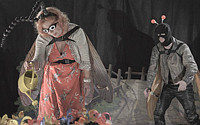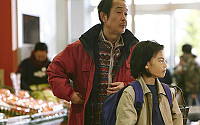| SHADOWS ON THE WALL | REVIEWS | NEWS | FESTIVAL | AWARDS | Q&A | ABOUT | TALKBACK | ||
 Shadows off the beaten path Shadows off the beaten path | ||
| Indies, foreigns, docs, revivals and shorts... | ||
|
On this page:
GIRL |
INSECT SOCRATES | SHOPLIFTERS < < F O R E I G N > > last update 20.Nov.18 See also: SHADOWS FILM FESTIVAL | ||
| R E V I E W B Y R I C H C L I N E | ||
Girl

| ||
|
dir Lukas Dhont prd Dirk Impens scr Lukas Dhont, Angelo Tijssens with Victor Polster, Tijmen Govaerts, Arieh Worthalter, Oliver Bodart, Katelijne Damen, Valentijn Dhaenens, Magali Elali, Alice de Broqueville, Alain Honorez, Chris Thys, Angelo Tijssens, Marie-Louise Wilderijckx  release Bel 17.Oct.18,
release Bel 17.Oct.18, US 18.Jan.19, UK 15.Mar.19 18/Belgium 1h49 TORONTO FILM FEST LONDON FILM FEST 
|  Belgian filmmaker Lukas Dhont takes a matter-of-fact approach to an extraordinary story, turning a teen trans girl's epic struggles into something that's remarkably easy to identify with. And without a traditional plot, the film builds a gnawing sense of dread that bottled-up feelings will lead to something very dark. Indeed, the climactic scenes deliver a powerful punch.
Belgian filmmaker Lukas Dhont takes a matter-of-fact approach to an extraordinary story, turning a teen trans girl's epic struggles into something that's remarkably easy to identify with. And without a traditional plot, the film builds a gnawing sense of dread that bottled-up feelings will lead to something very dark. Indeed, the climactic scenes deliver a powerful punch.
At 16, Lara (Polster) has been supported in her transition by her single dad Lewis (Govaerts), with a team of doctors overseeing her hormone treatments, which are progressing too slowly for Lara's liking. Moving to a new city, Lara begins training at a top dance academy, and her determination shows. But her school treats her in a special way that of course turns sour when classmates pick up on it. And her stress combines with the physical strain of dancing to jeopardise her health. Her father is worried, but Lara simply says that she's fine. Dhont carefully observes Lara's life over the course of several months as pressure builds on her. There are minor slights and some hideously awful ones as well, plus the constant criticism of her dance teachers. Through all of this, she is so intensely focussed on her goal that she refuses to let anyone in to help with her personal struggles. And since she's a teen, she has no idea that this is actually making her more vulnerable. The camerawork is subtle and cleverly revealing, drawing us right into her inner thoughts. Polster is frankly astonishing in the role. Not only is it physically demanding, from the full-on dance sequences to several moments that reveal her body consciousness, but there is also a vivid sense of Lara's thoughts and emotions in each scene. Each of the cast members matches this open, honest approach, from the superb Govaerts to young Bodart (as her little brother), Worthalter (as a neighbour who sparks her first flush of interest) and a range of authentic performances as the adults around her. It's rare to see such a topical story told in such a down-to-earth way. This is a film that takes Lara's situation seriously: it's never an issue for her, only for everyone around her, and it's their reactions that are a challenge. It's also a story about a typical teen who is impatient to grow up and begin her life on her own terms, putting the anguish of puberty behind her. Watching the events close in on Lara is seriously intense, and it leads to some seriously wrenching moments in the final act. This may feel a little over-the-top, but it definitely gets us thinking. | |
|
15 themes, language, sexuality 11.Nov.18 tiff
| | |
| R E V I E W B Y R I C H C L I N E | ||
Insect

| ||
|
dir-scr Jan Svankmajer prd Jaromir Kallista with Jan Svankmajer, Jaromir Dulava, Kamila Magalova, Jiri Labus, Ivana Uhlirova, Jan Budar, Norbert Lichy  release Cz 19.Feb.18 18/Czech Republic 1h38 
|  Czech maestro Jan Svankmajer playfully deconstructs the plot of this rather nutty romp about a quirky theatre company producing a topical pre-war play that was edited to offer the happy ending that the world didn't get. Combined with behind-the-scenes cutaways, this is the kind of indulgent chaos that shouldn't work at all, but its message about the value of all people, or bugs, comes seeping through the madness.
Czech maestro Jan Svankmajer playfully deconstructs the plot of this rather nutty romp about a quirky theatre company producing a topical pre-war play that was edited to offer the happy ending that the world didn't get. Combined with behind-the-scenes cutaways, this is the kind of indulgent chaos that shouldn't work at all, but its message about the value of all people, or bugs, comes seeping through the madness.
Fastidious and demanding, Patrick (Dulava) directs his ragtag cast in a rehearsal for the Capek brothers' The Insect Play, in which he's also starring as Mr Cricket opposite Rose (Magalova). But Vaclav (Budar) isn't murderous enough in his role as Wasp. And Karel (Labus) is rather far too immersed in his Dung-Beetle performance. There's also the sleepy Parasite (Lichy), who seems rather too bug-infested for the likes of Larva (Uhlirova). As their imaginations collide with their method-style performances, Patrick is perhaps a little too hopeful that they'll ever be able to get this on-stage. The film opens with a foreword from Svankmajer that's hilariously shown in all its unedited, B-roll messiness. And the filmmaker frequently interrupts the movie to direct scenes, which includes lifting of the curtain on his distinctive effects, bug-wrangling and stop-motion animated sequences. Watching the actors and crew put these sequences together is funny and fascinating, and it cleverly doesn't distract from the drama of the scenes themselves, which play in a more colourfully visual cinematic style. Each of the actors gets to play both themselves and their heightened characters, which adds a level of humour to the shambolic rehearsal scenes. They also cleverly blur the lines between reality and fiction, playing with the idea of creation itself. Dulava is terrific as the uptight director no one pays much attention to. Magalova's Rose is hilariously moving to her own acting instincts. And Budar gives Vaclav a wonderfully hapless vibe. Meanwhile, Svankmajer offers a knowing, witty glimpse into his own process. It's intriguing to note that The Insect Play is a political satire that predates Hitler and Stalin, and that the Capeks wrote it with a downbeat ending that their producers refused to accept. This adds a clever edge to the scenes as they play out, mixed in with the cutaways to the filmmaking. So while it's all a bit messy, it's a lively exploration of imagination, invention and expectations, complete with dreams, surprise twists and a blurring of the lines. It's also a wonderful collection of cinematic sight gags, plus a nice message about not gorging yourself while people around the world are starving. | |
|
15 themes, violence, language 4.Nov.18 tiff | ||
| R E V I E W B Y R I C H C L I N E | ||
Shoplifters
 MUST
MUST  SEE SEE
| ||
|
dir-scr Hirokazu Koreeda prd Kaoru Matsuzaki, Hijiri Taguchi, Akihiko Yose with Franky Lily, Sakura Ando, Kilin Kiki, Mayu Matsuoka, Kairi Jyo, Miyu Sasaki, Sosuke Ikematsu, Yuki Yamada, Moemi Katayama, Daisuke Kuroda, Kazuaki Shimizu, Izumi Maiguma  release Jpn 2.Jun.18,
release Jpn 2.Jun.18, UK/US 23.Nov.18 18/Japan 2h01 TORONTO FILM FEST LONDON FILM FEST THESSALONIKI FILM FEST
|  A family of underpaid workers turns to crime to make ends meet in this knowing drama from Japanese master filmmaker Hirokazu Koreeda. The film expertly catches the difficulties of people who have full-time jobs that don't pay enough to live on. Watching the film is so enjoyable that, like the characters, we hope the jig is never up. And where it goes is simply astonishing.
A family of underpaid workers turns to crime to make ends meet in this knowing drama from Japanese master filmmaker Hirokazu Koreeda. The film expertly catches the difficulties of people who have full-time jobs that don't pay enough to live on. Watching the film is so enjoyable that, like the characters, we hope the jig is never up. And where it goes is simply astonishing.
With a lively family to support, construction worker Osamu (Lily) resorts to shoplifting what they need. Then one day he returns home with a tiny girl named Yuri (Sasaki), who has clearly been abused. This further cramps the tiny home Osamu shares with his equally hard-working wife Nobuyo (Ando), pension-earning mother Hatsue (Kiki) and two kids: teen daughter Aki (Matsuoka), who works in a peep show, and the savvy younger son Shota (Jyo), who takes Yuri under his wing, teaching her the family business. But pressure is growing from a variety of sides. Koreeda finds telling details in every scene. Even the young Yuri, barely a toddler, has a vivid personality that wins over the family (and the audience). Their chaotic little house is packed to the rafters with wonderful clutter. When reports of Yuri's disappearance eventually hit the television, they're accompanied with stories of her parents' deception. And Yuri has no desire to go home. And several secrets in this family and quietly revealed as the story unfolds. This is so beautifully observed that cast members never seem to be acting. The six central characters have their specific internal yearnings, while together they're warm and funny, enjoying each others' company and unafraid to ask honest questions. While Lily's Osamu is the likeable teddy bear, Ando's Nobuyo is the pragmatic one. Kiki brings a luminosity to grandma that's deeply engaging. Matsuoka has a thoughtful hopefulness, especially when she bonds with a nice-boy client. And both Jyo and Sasaki bring distinct textures to some the film's most powerful moments. This is a clever look at how our hearts choose family members who will play an important role in our lives. Koreeda peppers the film with beautiful moments that reveal this idea in the way the characters interact, including scenes of silly activities, good-natured banter and some seriously lovely moments of intimacy. The story's main perspective is Shota's, and as he gets older and confronts the moral dilemma of this lifestyle, the film shifts into something darkly complex, leading to a stunning, moving conclusion that carries an important kick. | |
|
15 themes, language, sexuality 20.Nov.18
| | |
| R E V I E W B Y R I C H C L I N E | ||
Sócrates
 MUST
MUST  SEE SEE
| ||
|
dir Alex Moratto scr Thayna Mantesso, Alex Moratto prd Ramin Bahrani, Alex Moratto, Jefferson Paulino, Tammy Weiss with Christian Malheiros, Tales Ordakji, Jayme Rodrigues, Rosane Paulo, Caio Martinez Pacheco  release US 9.Aug.19,
release US 9.Aug.19, Br 26.Sep.19, UK 4.Sep.20 18/Brazil 1h11 
|  Produced by a workshop of young people aged 16 to 20, this Brazilian drama takes a bracingly realistic approach to its story of a teen living, in more ways than one, on the margins of society. Addressing economic issues, religion and sexuality, the film never tries to preach, instead offering an open-handed, humane approach that seeks compassion and hope in a situation that is increasingly desperate. It's a remarkable little film, beautifully shot and edited, and deeply moving.
Produced by a workshop of young people aged 16 to 20, this Brazilian drama takes a bracingly realistic approach to its story of a teen living, in more ways than one, on the margins of society. Addressing economic issues, religion and sexuality, the film never tries to preach, instead offering an open-handed, humane approach that seeks compassion and hope in a situation that is increasingly desperate. It's a remarkable little film, beautifully shot and edited, and deeply moving.
In a poor Sao Paulo suburb, 15-year-old Socrates (Malheiros) has nowhere to turn when his mother dies. No one will hire him because of his age, and he can't even collect his mother's ashes. He's also been harshly rejected by his religious father Robson (Rodrigues) for being gay. Then he meets another young guy, Maicon (Ordakji), and they begin a tender relationship. But even this is complicated by outside issues, plus the fact that both Socrates and Maicon have very hot tempers. Essentially, Socrates is very much left to sort this out himself. The script is careful to note that Socrates is not availing himself of help, as a social worker repeatedly tries to get through to him. But the people he does approach abandon him, removing options until he's left only with the unthinkable, including prostitution and suicide. Thankfully, filmmaker Moratto remains intensely personal about these darkly political themes, keeping cameras tight on Socrates' face to draw out his inner feelings. Malheiros is a remarkably expressive young actor, letting Socrates' emotions play across his face in ways that are both moving and frightening. This is a teen boy in a man's body, facing the world responsibly despite knock-backs. His connection with Ordakji is complex and tricky, starting out with a brawl and remaining fairly tumultuous even though their romance is sweet. Scenes with Rodrigues as his father are more intense, as Robson's love for his son is limited by conditions. Refreshingly, the filmmakers never try to overlay some sort of plot structure here. This may make it feel somewhat unstructured, leaving the narrative to Socrates' emotional journey. Watching him take on everything that is thrown at him is powerfully involving, touching on a wide range of social issues that are rarely explored on the big screen. And the most remarkable thing about the film is how it never moralises, merely presenting this as an everyday struggle. So without making it obvious, the finger is pointing right at us, asking us to see and offer help to those in need. | |
|
18 themes, language, violence 7.Nov.18 tiff | ||


See also: SHADOWS FILM FESTIVAL © 2018 by Rich Cline, Shadows
on the Wall
| ||
